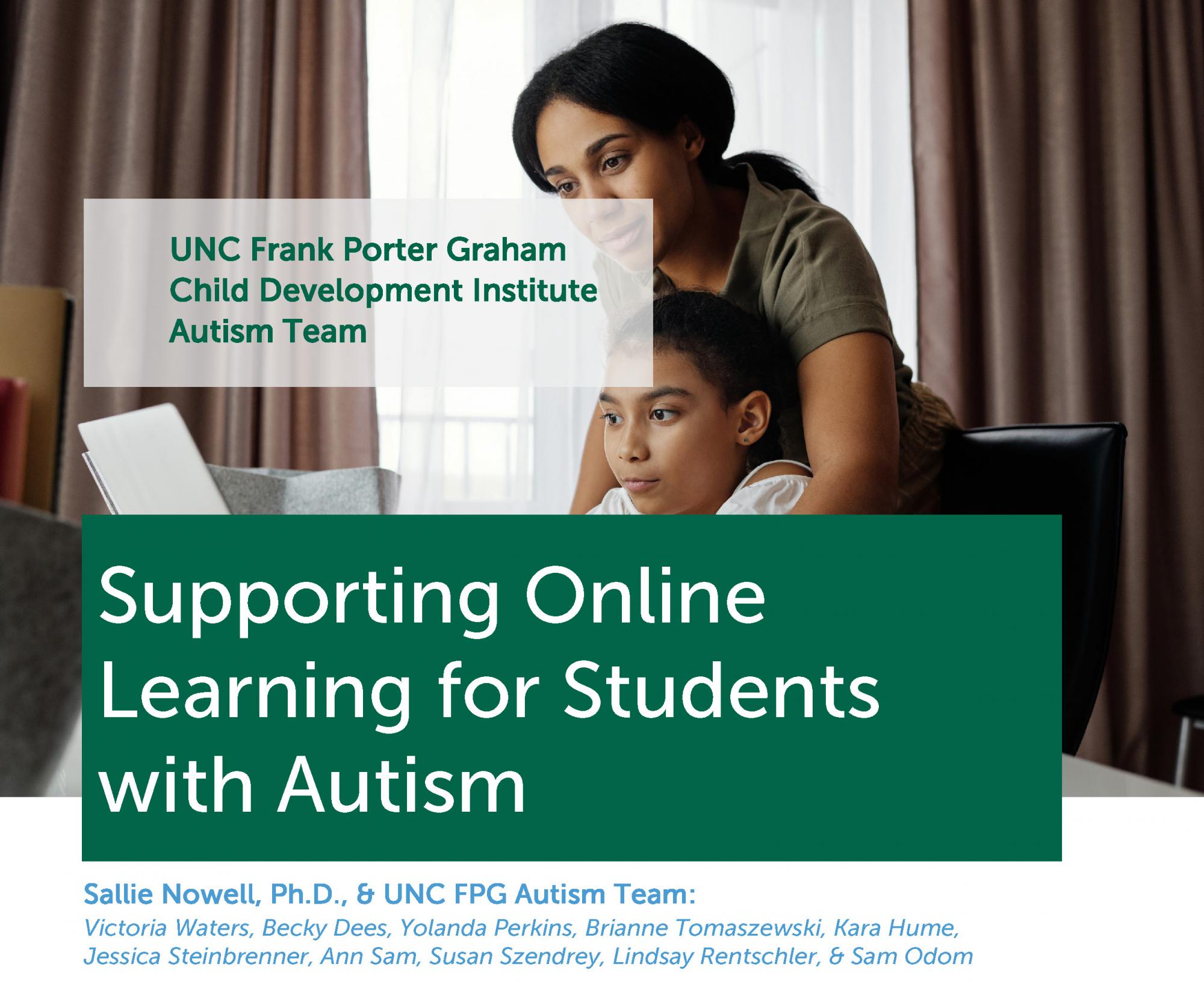
FPG Autism Team Releases New Resources as Online Learning Continues Into the New School Year
In response to the ongoing needs of children with autism, their families, and teachers during the COVID-19 pandemic, the autism team from the UNC Frank Porter Graham Child Development Institute (FPG) and UNC School of Education has released a new collection of resources that offers comprehensive support and guidance for navigating the virtual school environment.
"Supporting Online Learning for Students with Autism," is a free resource that offers strategies to support online learning for students with autism spectrum disorder (ASD), including relevant approaches that reach all ages, from pre-kindergarten through college, and cover the kinds of challenges they might face in virtual classrooms.
"Online learning comes with logistical and social changes that can be particularly challenging to students with autism who prefer structure and routines," says Sallie Nowell, PhD, a postdoctoral fellow at FPG who led this project. "For some students in hybrid or virtual learning environments, there are new expectations, such as attending school only several days per week and participating in class discussions via Zoom instead of in-person. This guide offers support to families and sets students up for success."
The guide covers five main strategies to support online learning for individuals with autism:
- Create a learning space and limit distractions – recommendations on designating, personalizing, and arranging learning spaces in the home
- Create a schedule – customizable templates and examples of schedules for all ages and time management tips
- Access learning platforms – comprehensive guidance (visual and text) on using Zoom, Google Classroom, and Canvas
- Support active participation – resources on digital etiquette and online learning expectations
- Maintain healthy habits and take breaks – ideas on how to transition off screens, stay active, and choose healthy snacks and exercise activities
"We'd heard a lot from teachers and parents when learning moved online in the spring that particular platforms were challenging when it came to troubleshooting things that went wrong. Students also need guidance about things like virtually raising your hand, using the chat function, making eye contact, or reading social cues online. Some of these things can be really hard for some students, and we want to address and provide support for these issues," says Kara Hume, PhD, a faculty fellow at FPG and associate professor at the School of Education who is part of FPG's autism team.
Resources included are instructional flyers, tips and checklists for parents, visual supports for students, sample schedules, and to-do lists for all ages from preschool and elementary up to college age and templates parents can print out and customize to meet their students' needs.
"We know that there are different needs across age groups on the autism spectrum, and our team does a lot of work with students and parents that spans all age groups. We are uniquely equipped to address all the ages and learning needs you find across the spectrum," says Nowell.
The group released two other guides this spring: "Supporting Individuals with Autism through Uncertain Times," which was released in March 2020 as the nation began to move most schools and services to virtual environments to stop the spread of the COVID-19 virus, and "Supporting Adults with Autism through Uncertain Times: Companion Guide," which followed in April 2020. These resources have been translated into nine languages and have been downloaded and viewed hundreds of thousands of times around the world from FPG's AFIRM website.
As it became clear that educational environments would remain in the virtual space throughout the fall, the autism team began to create a new guide that pulled from lessons learned in the spring and summer and from the feedback they received from teachers, parents, and individuals with ASD, says Becky Dees, an educational consultant at FPG.
"We know our previous resources gave families a place to get started and helped them feel more supported and less alone during this time," says Dees. "Our new guide is in direct response to what we were hearing from teachers and parents about students' experiences in online learning, and we wanted to provide something that would meet daily needs that may come up in the coming school year."
In addition to Nowell, Hume, and Dees, FPG's interdisciplinary autism team includes Nancy McIntyre, PhD, Sam Odom, PhD, Yolanda Perkins, MEd, Lindsay Rentschler, Ann Sam, PhD, Jessica Dykstra Steinbrenner, PhD, Susan Szendrey, MOT, Brianne Tomaszewski, PhD, Victoria Waters, MEd, and Mary White, PhD.